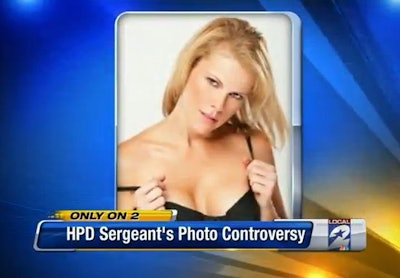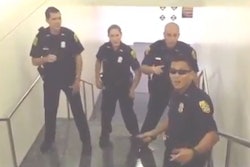 Screenshot via KPRC.
Screenshot via KPRC.
When I was in high school, every month Playboy would run a pictorial titled "The Girls of…." There were issues that featured women of a certain college, or a pro team's cheerleaders, or the military, and I remember at least one that featured women of law enforcement. Invariably some of these women would be censured by their employers or the schools they attended for participating. I remember one of the Women of Law Enforcement was suspended or fired.
And rightfully so. For next to her nude picture was a picture of her on the job in uniform and her agency was identified in the caption. She clearly brought the wrong kind of attention to her employer. Which is something that cops shouldn't do.
But today, cops are being punished for activities that they participated in while off duty and while not identifying themselves as officers. So one has to ask the questions: What is an officer permitted to do off duty? Where are the red lines? And at what point do officers lose their First Amendment rights?
Let's look at three recent cases:
Candyance Davis was a nine-year veteran of the Memphis Police Department. Her hobby was rapping under the stage name Quolove, and she made a video portraying herself as a violent gangster in which she rapped her composition "Gimme Me." Her video is amateurish, her rapping is awful (you can barely understand a word), and OK, maybe throwing gang signs during the performance was ill conceived. But it is a performance and at no time does she identify herself as an officer. Regardless, she was fired. Maybe the Memphis PD has a case. Still, I have to ask would it fire an officer who acted in his spare time and portrayed a gangster on stage or in a film? What about an officer who rapped a violent song in one of Memphis' many clubs?
Stacey Suros serves with the Houston Police Department and apparently she wanted to make some money on the side as a model for erotic photography. So she posted some 100 photos of herself in various poses on a site called ModelMayhem.com, offering up her services to photographers. The images were posted under the name "Tessoro;" no mention was made of her real name or her affiliation with the HPD. But someone recognized the 42-year-old single mother's pictures, the cat was out of the bag, and the HPD brass were not amused. Suro was suspended and she is being investigated by internal affairs to determine if she should be fired for violating HPD policy. That policy says: "Employees shall exhibit professional conduct at all times and shall not engage in any activity, including unlawful activity, that would degrade or bring disrespect upon the employee or the department." Not to get all Supreme Court about this, but who gets to determine what is "degrading" or "disrespectful?" That's a pretty subjective standard.
Gared Hansen is a veteran San Francisco officer. He was suspended in 2009 and again in 2010 for taking photos of naked women. He is suing the department on the grounds that he did the photography on his own time and "with absolutely no connection to his employment." The most bizarre aspect of this case is that it is happening in San Francisco, home of the infamous fetish and S&M lifestyle celebration known as the Folsom Street Fair. It's San Francisco, not some city deep in the Bible Belt; almost anything goes in San Francisco, and much of that anything is condoned or at the very least tolerated by the police department. Are you telling me that there's not a single San Francisco cop participating in the local debauchery? Would the department have punished Hansen if he was painting nude women? Would the San Francisco PD have dared to punish Hansen if his models were nude men?
I guess the argument by these departments is that their officers lose their personal lives when they pin on their badges. Like the Marines say, "If the Corps wanted you to have a personal life, it would have issued you one." But what the Marines who say that and what these agencies seem to have forgotten is that you have been issued one. It was issued to you on December 15, 1791, when the Bill of Rights was ratified. And as long as you don't bring your agency and your position into your activities and you don't violate the law, you don't surrender your personal lives when you take your oaths.


















